Academic Freedom, Censorship, Freedom Of Speech, Gaza, genocide, Human Rights, Targeting Muslims
Podcast: Play in new window | Download
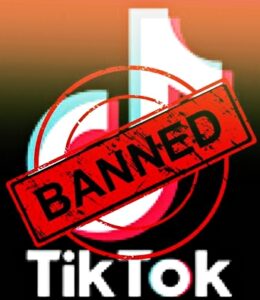
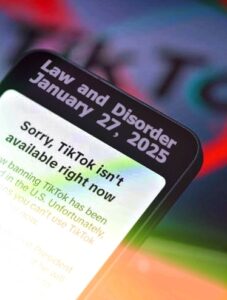
The First Amendment And TikTok
On January 17, for the first time in modern American history, a unanimous US Supreme Court upheld a sweeping prior restraint on free speech imposed by Congress banning over 170 million users in the United States from having access to the popular social media platform TikTok that the Court itself admitted “allows users to create, publish, view, share, and interact with short videos overlaid with audio and text.” In 2023 alone, U. S. TikTok users uploaded more than 5.5 billion videos, which were in turn viewed more than 13 trillion times around the world. The avoid the ban, the law requires TikTok’s parent company, the China-based ByteDance, to divest its ownership.
From January 18 to 19, the ban was in effect for about 12 hours until Donald Trump tweeted that as President he would grant a stay of execution, pending a potential sale of TikTok. It was only 12 hours some may say, but it is estimated that during that time the ban blocked 6,750,000 videos that would have been viewed over 178,000,000 times worldwide. The ban is easily the most extensive act of censorship in human history.
Shortly after he was sworn in, Trump signed an Executive Order purporting to suspend the ban for 75 days. Serious questions have been raised whether Trump’s order is legal and enforceable. And despite his order, Apple and Google have still not reinstated TikTok at their stores preventing new subscribers from accessing TikTok.
Meanwhile, the First Amendment rights of 170 million TikTok users hang in the balance.
Guest – Ramya Krishnan is a senior staff attorney at the Knight First Amendment Institute at Columbia University and a lecturer in law at Columbia Law School. Her litigation focuses on issues related to government transparency, protest, privacy, and social media. Ramya co-authored the Knight Institute’s amicus brief in TikTok. v. Garland, one of the lawsuits challenging the constitutionality of the TikTok ban which resulted in the Supreme Court’s decision. Read Amicus Brief
—-

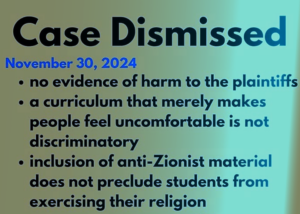
Federal Court Rejects Attempt To Remove Ethnic Studies Curriculum
As Israel’s war in Gaza and the West Bank rages on, the free speech battles here in the United States continue with Congress, state legislatures and college administrators trying to silence pro-Palestinian protests by conflating criticism of Israel with the odious epithet of “antisemitism.” Pro-Palestinian groups are being banned, students are being disciplined, and faculty members are being suspended and fired.
But last November, there was some hopeful news when a federal court rejected attempts by Jewish parents and teachers to remove an ethnic studies curriculum from the Los Angeles Unified School District that they had labelled “antisemitic” and “anti-Zionist.”
On November 30, 2024, in a 49-page ruling, U.S. District Judge Fernando M. Olguin wrote that a system of education “which discovers truth out of a multitude of tongues” must allow teachers and their students “to explore difficult and conflicting ideas.” He added that “we must be careful not to curb intellectual freedom by imposing dogmatic restrictions that chill teachers from adopting the pedagogical methods they believe are most effective,”
The ruling represents a welcome rebuke to the efforts of Republican state legislators and conservative parent groups to try to restrict the teaching of comprehensive American history in public schools, to ban books that examine that history as well as racism, sexism, and LGBTQ issues, and to eliminate programs that seek to ensure diversity, equity, and inclusion in American education.
In 2022, a group calling itself “Concerned Jewish Parents and Teachers of Los Angeles,” comprised of what the lawsuit calls Jewish, Zionist teachers and parents of students sued the Los Angeles Unified School District; United Teachers of Los Angeles; its president Cecily Myart-Cruz; the Liberated Ethnic Studies Model Curriculum Consortium; Theresa Montaño, the Consortium’s secretary; and Guadalupe Carrasco, its co-founder.
To discuss the important free speech and academic freedom issues involved in this case, we’ve invited the lawyer who represented the ethnic studies curriculum, Ms Montano and Ms Carrasco.
Guest – Mark Kleiman is a former activist and organizer and a long-time civil rights and human rights attorney. With extensive experience in whistleblower protection, he has brought cases that exposed massive fraud against public programs and has forced drug companies, nursing home chains, and defense contractors to repay hundreds of millions of dollars. Since 2019 he has devoted thousands of hours to defending activists, scholars, and students who have been attacked for their defense of Palestinian human rights.

————————-
Censorship, Civil Liberties, Civil Rights, Freedom Of Speech, Human Rights
Podcast: Play in new window | Download
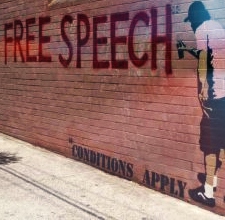
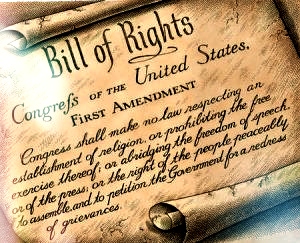
Book Banning, Censorship And Freedom Of Speech
Americans have a love-hate relationship with freedom of speech: They love to protect their own free speech and they hate to protect the free speech of those they disagree with. The First Amendment to the US Constitution was intended to protect freedom of speech and freedom of the press, yet throughout American history, governments at all levels have censored speech and tried to muzzle the press.
The anti-censorship group PEN America, in a survey of the 2022-23 school year, found that “freedom to read is under assault in the United States — particularly in public schools — curtailing students’ freedom to explore words, ideas, and books.” Authors whose books are targeted are most frequently female, people of color, and/or LGBTQ+ individuals.
According to the American Library Association, the number of titles targeted for censorship surged 65 percent in 2023 compared to 2022, reaching the highest levels it has ever documented. According to Deborah Caldwell-Stone, director of ALA’s Office for Intellectual Freedom, “Each demand to ban a book is a demand to deny each person’s constitutionally protected right to choose and read books that raise important issues and lift up the voices of those who are often silenced.”
Guest – Robert Corn-Revere is Chief Counsel for the Foundation for Individual Rights and Expression, known as “FIRE.” He has practiced First Amendment law for 40 years. From 1989 to 1994, Corn-Revere served as legal advisor and later chief counsel to the Chairman of the Federal Communications Commission.
Corn-Revere is a prominent writer, thinker, and advocate on free expression issues and is regularly listed as a leading First Amendment and media lawyer by various national publications. He co-authored the three-volume treatise, “Modern Communication Law.” In 2021, Cambridge University Press published his book, “The Mind of the Censor and the Eye of the Beholder: The First Amendment and the Censor’s Dilemma,” which explores how free expression became a part of America’s identity. I reviewed “The Mind of the Censor” for Los Angeles Review of Books and called it an “entertaining, enlightening, and timely book.”
Another form of censorship – Report: Record Number of Journalists Killed in Gaza by Stephen Rohde
—-
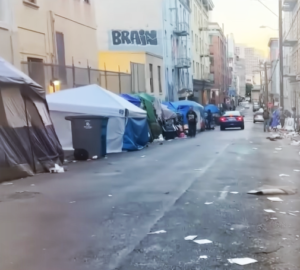
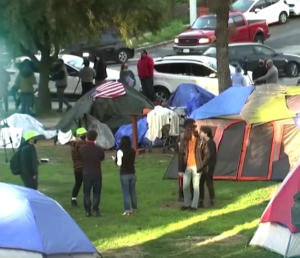
Disappeared: Criminalizing The Unhoused
Late this June, the U.S. Supreme Court ruled that cities can punish people for sleeping in public places. In a 6-3 decision along ideological lines, the Court overturned lower court rulings that held it is cruel and unusual punishment under the Eighth Amendment to penalize people for sleeping outside if they had nowhere else to go. This ruling now allows localities the right to dismantle encampments of tents and cardboard coverings, even when there is no locally available housing or shelter.
Human Rights Watch has condemned this ruling and released a comprehensive report titled, You Have to Move! The Cruel and Ineffective Criminalization of Unhoused People in Los Angeles. The report documents the experiences of persons living on the streets, in vehicles, in temporary shelters, and in parks as they struggle to survive. In Los Angeles alone, tens-of-thousands of people are living in the streets, with death rates among the unhoused population reaching alarming levels. Governor Gavin Newsom, a supporter of the Court’s decision, has urged all local jurisdictions in California to destroy unhoused encampments. Several cities in the state have already begun doing so.
Western Regional Advocacy Project
The lack of housing is a national crisis, and this ruling raises the risk of increased use of such punitive tactics not only in Los Angeles but across the entire country.
Guest – John Raphling, Senior Researcher in the U.S. Program of Human Rights Watch and author of the report we’ve mentioned. Before joining Human Rights Watch, John spent years as a Deputy Public Defender in Los Angeles. He has represented political and community activists targeted for their activism, and homeless people prosecuted for crimes related to their status. John is also a member of the National Lawyers Guild.

———————————–
Censorship, Civil Liberties, Civil Rights, Criminalizing Dissent, genocide, U.S. Militarism, War Resister
Podcast: Play in new window | Download


Free Speech: Protest Testing The Limits Of Protection
As controversy rages over protests, encampments, and arrests at hundreds of college campuses around the country, in reaction to the war in the Middle East, free speech is once again at the forefront of national debate. Time and again in American history, the nation has been gripped by the complex question of whether certain speech is or is not protected by the First Amendment. Recently, college presidents have been under fire for failing to protect free speech or for going too far in tolerating free speech. Some have been forced to resign and others have called in the police. Students have been attacked; others have been suspended; student political organizations have been banned. What’s going on and where does the First Amendment fit into all this?
Guest – Nadine Strossen, a leading expert on constitutional law and the First Amendment. Nadine Strossen is Professor of Law Emerita at New York Law School and served as President of the American Civil Liberties Union from 1991 until 2008. She is a Senior Fellow with the Foundation for Individual Rights and Education and is on the advisory boards of the ACLU, Academic Freedom Alliance, Heterodox Academy, National Coalition Against Censorship, and the University of Austin. The National Law Journal has named Strossen one of America’s “100 Most Influential Lawyers,” and in 2023, the National Coalition Against Censorship selected her for its Judy Blume Lifetime Achievement Award for Free Speech.
She is the author of HATE: Why We Should Resist It with Free Speech, Not Censorship (2018) and Free Speech: What Everyone Needs to Know® (2023). Her book Defending Pornography: Free Speech, Sex, and the Fight for Women’s Rights was named a New York Times “notable book” of 1995, and was republished this year as part of the New York University Press “Classic” series.

——————————–
Censorship, Civil Liberties, Civil Rights, FBI Intrusion, Gaza, Supreme Court
Podcast: Play in new window | Download
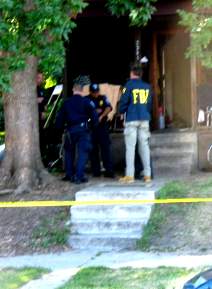
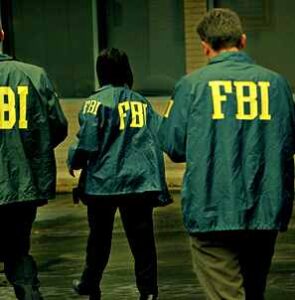
Sealed Search Warrant After Raiding Journalist’s Home Leaves News Gatherers Timid
At 6 a.m. on May 8, seven FBI agents with guns drawn raided the home newsroom of Florida journalist Tim Burke. For nearly 10 hours, they seized computers, phones, video equipment and other devices. The raid came on the heels of Burke’s obtaining outtakes of Tucker Carlson’s interview with Ye (formerly known as Kanye West). In those outtakes, Ye made antisemitic and other offensive remarks. The FBI investigation involves alleged violations of the Computer Fraud and Abuse Act, or CFAA.
It is not clear why prosecutors believe Burke, who runs the media company Burke Communications, broke the law. That’s because the government successfully fought to keep the affidavit supporting the search warrant sealed from public view. As listeners may recall, the CFAA is the federal law that prohibits unauthorized access to a computer. Burke has said he got the outtakes from websites where Fox News uploaded unencrypted live streams to URLs that anyone could access, using publicly accessible login credentials.
In response to the raid, more than 50 organizations sent a letter to the Department of Justice in October demanding transparency about the government’s basis for believing that Burke’s newsgathering broke the law. Florida’s First Amendment Foundation and the ACLU took the lead on the letter, with the Committee to Protect Journalists, Reporters Without Borders, PEN America, the Electronic Frontier Foundation and the Society of Professional Journalists, among others, also signing on.
Guest – Seth Stern, Advocacy Director at the Freedom of the Press Foundation (FPF). Prior to joining FPF, Seth practiced media and First Amendment law in Chicago for more than a decade. Before that, he worked as a reporter and editor in the Chicago and Atlanta areas.
—-
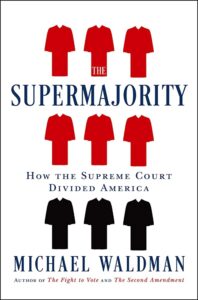
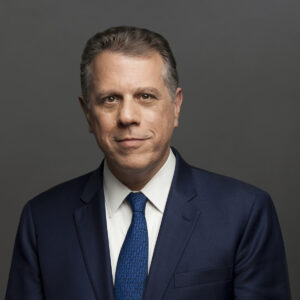
The SuperMajority : How the Supreme Court Divided America,
In late June 2022, a package of Supreme Court decisions drastically altered the nation’s legal landscape and divided the nation. It took just three days to roll back some of the most consequential gains for civil rights, voting, the separation of church and state, a woman’s right to choose, and more.
In his new book The SuperMajority : How the Supreme Court Divided America, Michael Waldman offers an in-depth analysis of the 2022 key rulings and the radical ways in which they were crafted. He provides historical context for how the Supreme Court has amassed power far beyond what the Framers intended, and how the current supermajority ascended to the high court. Waldman also points to previous Courts (on both the right and the left) that overreached and describes their consequences for the country. Significantly, he writes that the seizure of so much power by a few members of the Court, and their energetic wielding of it, poses a crisis for U.S. democracy.
A backlash against the Court is underway. Rather than seeking a supermajority of their own, Waldman writes that, “Liberals must fall out of love with the Supreme Court.” He recommends reform measures to curb the Court’s power while applying other pressure points – such as in the court of public opinion.
Guest – Michael Waldman is the president and CEO of the Brennan Center for Justice at NYU Law School, a nonpartisan law and policy institute. An expert on the Constitution and the courts, Waldman served on President Joe Biden’s commission on the Supreme Court. He is the author of The Fight to Vote and The Second Amendment: A Biography. Waldman was director of speechwriting during the Clinton administration. Sign up for newsletter – Briefing
Hosted by attorneys Heidi Boghosian and Marjorie Cohn

———————————–
Censorship, Civil Liberties, Civil Rights, Political Prisoner, Prison Industry, Racist Police Violence, Torture
Podcast: Play in new window | Download
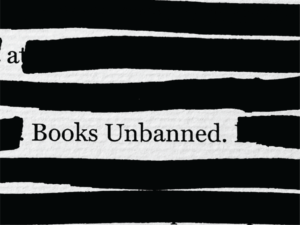
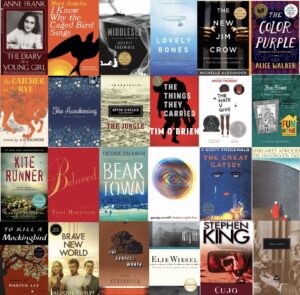
Books Unbanned
Authoritarian institutions and regimes ban books. They tell people what they can and cannot read. The Catholic Church once banned the book by mathematician Johannes Kepler which demonstrated that the earth travels around the sun and not vice versa.
Many of us know about the bonfires of banned books by the “degenerate Jews” Sigmund Freud and Karl Marx that the Fascist Hitler regime lit with a frenzy.
Can this happen in America? It has already started. Many state legislatures have moved to ban books. Some 250 titles have been put on a list of books that cannot be assigned to grade schoolers and highschoolers including such classics in the American canon as “To Kill a Mockingbird”’ and even “ Catcher in the Rye”
The censors don’t want to encourage free spirits. They don’t like criticism. For them the ideal citizen does not think for himself or herself, keeps her mouth shut, and goes along.
The Brooklyn public library is fighting for the rights of teenagers and young adults to read what they like, discover themselves, and form their own opinions. The library launched a campaign called “Books Unbanned” in response to the increasingly coordinated and effective effort to remove books from shelves which tackle a wide range of topics.
There were 1597 individual book challenges last year, the highest of 20 years since the American Library Association has been keeping track.
The Brooklyn public library is the sixth largest in the country. It started defending the right to read last April by giving free library cards to young people in every state in the union. So far 5100 cards have been given out. 52,000 e-books or audiobooks have been checked out. The books that are most frequently challenged are those on sexuality and those on racism.
Guest – Nick Higgins, Chief Librarian at Brooklyn Public Library, leading the development of transformative library services and spaces for the borough’s residents at 61 sites. Along with providing traditional programs and experiences for Brooklynites, Nick and his team have expanded the Library’s reach by creating unique programs for older adults, individuals and families impacted by the justice system, immigrants, and people experiencing homelessness. Nick holds a BA in Literature from Hunter College and a MLS from the Pratt Institute. Booksunbanned@bklynlibrary.org
—-

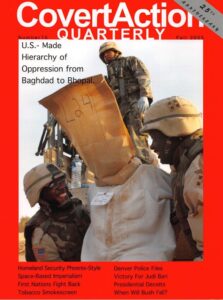
Law and Disorder hosts Heidi Boghosian and Michael Smith remember New York City Attorney and publisher Bill Schaap.
Bill Schaap died in his home on February 25th after a long illness. He was 75. After graduating from the University of Chicago Law school in 1964 Schaap worked for the Center for Constitutional Rights on its project in Japan representing antiwar GIs during the Vietnam war. For 20 years he and his companion the late Ellen Ray lived in Washington DC and published and wrote for the magazine “Covert Action Quarterly” which exposed the crimes of the CIA. In its early years they named CIA agents, until a naming names act was passed by Congress making the exposure of agents a crime. In the early 80s they moved to New York City and founded Sheridan Square Press. They published books about the CIA by former CIA agents. Most prominently they published New Orleans district attorney Jim Garrison’s book “On the Trail of the Assassins” showing CIA involvement in the Kennedy assassination. The book became a New York Times bestseller and was the basis for the Oliver Stone movie “JFK”. In the early 90s they founded the Institute For Media Analysis and began publishing the magazine “Lies of Our Times”, a magazine of media criticism. Bill Schaap was a recognized expert in government propaganda and wrote and spoke widely and frequently on the topic.
—-
Lawyers You’ll Like: Attorney Bill Schaap
Attorney William Schaap graduated from the University of Chicago Law School in 1964 and has been a practicing lawyer since. Bill specialized in military law and practiced in Asia and Europe. He later became the editor in chief of the Military Law Reporter in Washington for a number of years. In the 70’s and 80’s he was a staff counsel of the Center for Constitutional Rights in New York City. In the late 80s, he was an adjunct professor at John J. College of Criminal Justice of the City University of New York where he taught courses on propaganda and disinformation.
Attorney William Schaap:
- One of first cases at this big Wall Street firm, they had some outside counsel working on it, one of whom was David Lubel, and Dave Lubel who had I think been a recruiter for the Communist Party in his youth, was always good at spotting somebody who was always worth recruiting and he started to tell me there was this convention of this lawyers group.
- It was this 1967 Lawyers Guild Convention in New York. He dragged me to one event, I met Bill Kunstler, I met Arthur Kinoy, I met Victor Rabbinowitz. I’d been on Wall Street for a year or two, I said I didn’t know there were lawyers like this.
- I joined the same day and met Bernadine Dorhn and a few weeks she called me and said we need your help.
- She said you gotta defend a bunch of Columbia students. The next thing I knew the riot started at Columbia and she said you have to go down there and defend them.
- I signed up to be staff counsel on the National Lawyers Guild Military Law Project in Okinawa, Japan.
- When you work overseas in that kind of a climate with the military you learn a lot fast about American imperialism.
- Once you learn that, you learn about the CIA.
- That led us to originally working on Counter Spy magazine and then on Covert Action Magazine.
- The original purpose was to expose the CIA. We worked with Lou Wolf who is an expert in uncovering CIA agents in US embassies, not through any classified documents but because if you knew how to read the paperwork and State Department things, you could tell who are the “ringers.”
- We were so successful that Congress passed a law against us.
- Our goal was to make these people ineffective because the only way most CIA could work, particularly the ones that were assigned to an embassy was to have to pretend to be something else.
- They were all third assistant political secretaries and those were all phony things. Their job was to finagle their way into various community organizations in whatever foreign capital they were posted to recruit people to turn against their own countries and become traitors to their own countries, to become spies for the U.S.
- We thought if we identified these people, it might make their job a little bit harder, which it did.
- Of course, the problem with that is the government said we were trying to get them killed which we weren’t trying to do and nobody we did expose ever did get killed.
- He (Philip Agee) had been an adviser to Counter Spy. Counter Spy folded when Welch got killed, cause the pressure was too much and started Covert Action Quarterly.
- He was not the person discovering who the under cover people were, Lou Wolf was doing that.
- Phil wrote articles for us in every issue and we worked very closely with him.
- Once you start exposing these things, they really don’t have any defense.
- They tried to catch us in something phony. We would get tips that would turn out to be CIA trying to get us to print some story that wasn’t true so they could then discredit us.
- We had more interference from the government when we were doing military law work, before Covert Action Quarterly.
- They would plant bugs in our attic in Okinawa, things like that.
- The Intelligence Identity Protection Act has 2 parts. One makes it a crime for someone in the government who has classified information to reveal someone’s identity. The second part makes it a crime to reveal the identity of someone you did not learn from classified information or you position. (But if you were in the business of exposing these people . . .)
- Regarding his newsletter The Lies of Our Times – It was in the 90s, from 1990 to 1995 I think. To a certain extent, the abuses we were crying about got a little bit less over time because that’s sometimes the helpful result of that kind of exposure.
- We were just tired of people thinking that if it was in the New York Times it must be true.
- The fact is that those people lie all the time.
- I think we’ve gotten to a point where people recognize that the government lies to them and that there’s an awful lot that goes on that they don’t know.
Guest – Attorney William Schaap graduated from the University of Chicago Law School in 1964 and has been a practicing lawyer since. Bill specialized in military law and practiced in Asia and Europe. He later became the editor in chief of the Military Law Reporter in Washington for a number of years. In the 70’s and 80’s he was a staff counsel of the Center for Constitutional Rights in New York City. In the late 80s, he was an adjunct professor at John J. College of Criminal Justice of the City University of New York where he taught courses on propaganda and disinformation.
In addition to being a practicing lawyer, Bill was a journalist, publisher and a writer specializing in intelligence as it relates to media. He was the co-publisher of a magazine called the Covert Action Quarterly for more than 20 years. He also published a magazine on propaganda and disinformation titled Lies Of Our Times. Attorney Bill Schapp has written numerous articles and edited many books on the topic of media and intelligence.

—————————-
Censorship, Civil Liberties, Civil Rights, Human Rights, Targeting Muslims
Podcast: Play in new window | Download
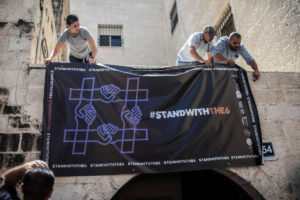
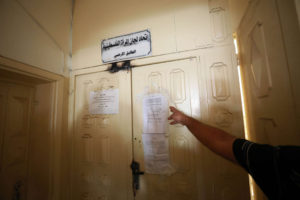
Israeli Forces Raid and Shutter Seven Palestinian Human Rights Organizations
On August 18, the Israeli military raided the offices of seven leading Palestinian human rights and civil society organizations, ransacking and shuttering them. Three days later, the Israeli Occupying Forces summoned the directors of two of the groups for interrogation.
Last October, Israeli Defense Minister Benny Gantz reported that Israel had designated six of the groups as “terrorist organizations” because they had links to the Popular Front for the Liberation of Palestine (PFLP), a leftist political party with a military wing. In November, the Israeli military commander in the occupied West Bank declared the six to be “unlawful associations.” But in the ensuing months, Israel has failed to come forward with competent evidence that links the six groups to the PFLP. A new classified report from the CIA says it could find no evidence to support the terrorist designations.
Progressive organizations in Israel and the United States condemned the raids. But the Biden administration has refused to denounce them, stating that it is awaiting further information from Israel.
Guest – Law and Disorder co-host Marjorie Cohn is interviewed about the ramifications of the terrorist designations and recent raids on the organizations. She is professor emerita at Thomas Jefferson School of Law, former president of the National Lawyers Guild, and a member of Jewish Voice for Peace and the bureau of the International Association of Democratic Lawyers.
—–

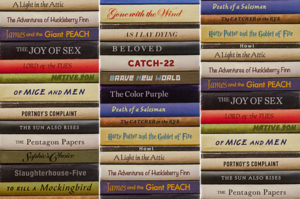
A New Wave Of Book Banning
Book banning is the most widespread form of censorship in the United States. It’s when government officials, private individuals, or organizations remove books from libraries, school reading lists, or bookstores because they object to the content or themes contained therein. Children’s books are the main targets.
Often, complaints are that the book contains is sexually explicit, contains graphic violence, has offensive language, or shows disrespect for parents and family. Censors claim they’re afraid the contents are dangerous for kids, or that they’ll cause young people to raise questions, and incite critical inquiry among children that parents, political groups, or religious organizations deem inappropriate or aren’t ready to address.
Before the 1970s book bans typically focused on obscenity. Lady Chatterley’s Lover by D. H. Lawrence and Ulysses by James Joyce were often banned. From the late 1970s on, attacks focused on ideologies. To Kill A Mockingbird, The Color Purple, The Catcher in the Rye, and Harry Potter are among the 50 of the top banned books in this country.
A new wave of book banning in public and school libraries is sweeping the nation in 2022. It’s been under way since debates have percolated over critical race theory and what students should learn in the classroom. Several states are cutting funding for books written by authors in specific communities.
Guest – Christopher Finan, executive director of the National Coalition Against Censorship. He previously served as president of the American Booksellers Foundation for Free Expression, the bookseller’s voice in the fight against censorship. Before that, he was executive director of Media Coalition, a trade association that defends the First Amendment rights of producers and distributors of media. Christopher is the author of From the Palmer Raids to the Patriot Act: A History of the Fight for Free Speech in America by Beacon Press, which won the 2008 Eli Oboler Award of the American Library Association. His forthcoming book is How Free Speech Saved Democracy.

———————————





















